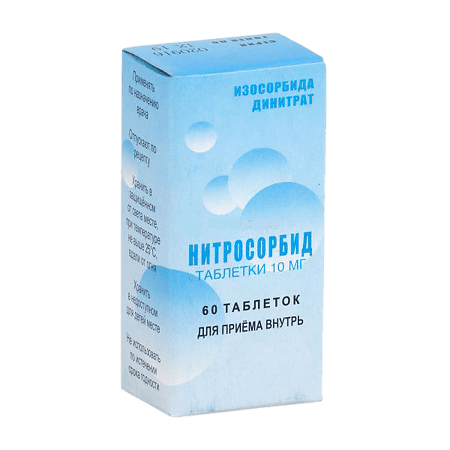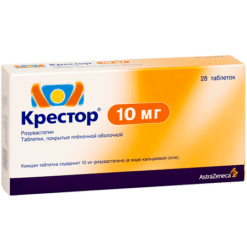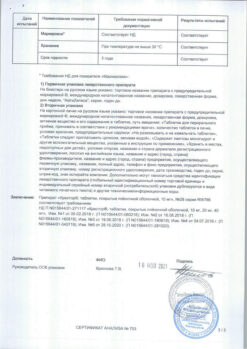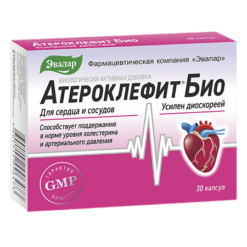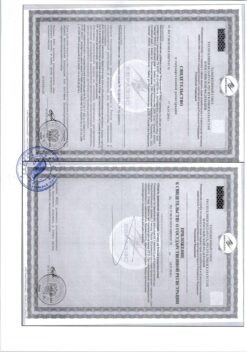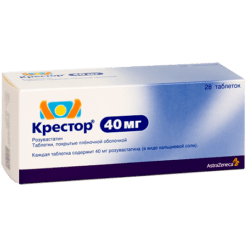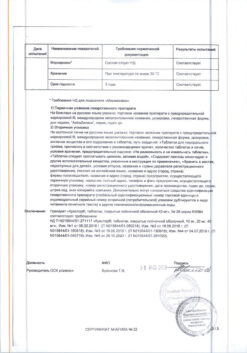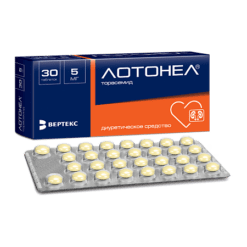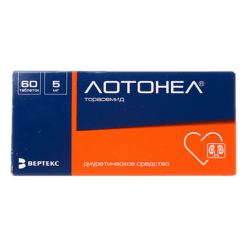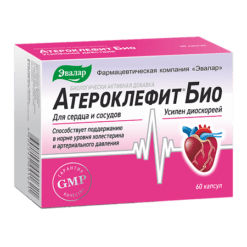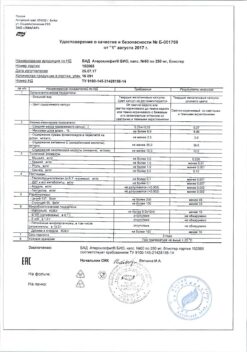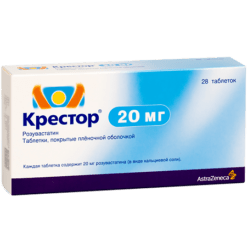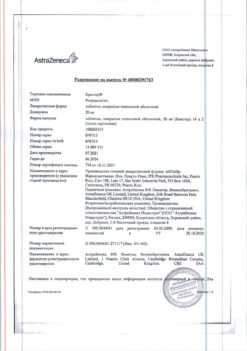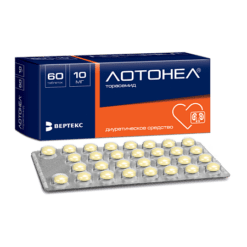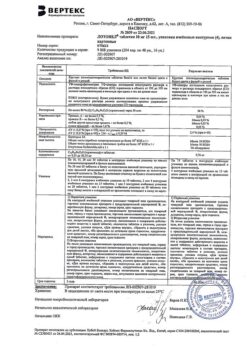No products in the cart.
Nitrosorbide, tablets 10 mg 60 pcs
€1.24 €1.13
Description
Peripheral vasodilator with predominant effect on the venous vessels. Antianginal agent. The mechanism of action is associated with the release of the active substance nitric oxide in the vascular smooth muscle.
Nitric oxide causes activation of guanylate cyclase and increases the level of cGMP, which ultimately leads to relaxation of smooth muscles. Under the influence of isosorbide dinitrate, arterioles and precapillary sphincters relax less than large arteries and veins. This is partly due to reflex reactions, as well as less intense formation of nitric oxide from the active substance molecules in the walls of the arterioles.
The action of isosorbide dinitrate is mainly due to the reduction of myocardial oxygen demand by reducing preload (dilation of peripheral veins and reduction of blood flow to the right atrium) and postload (reduction of PPS), as well as the direct coronary dilatation action. It promotes redistribution of coronary blood flow in the area with reduced blood supply.
Enhances exercise tolerance in patients with CHD, angina pectoris. In heart failure helps to unload the myocardium by reducing the preload. It decreases pressure in the small circle of the circulation.
Indications
Indications
For oral, sublingual, buccal administration: relief and prevention of angina attacks, rehabilitation treatment after myocardial infarction. Chronic heart failure (as part of combination therapy), some forms of pulmonary hypertension, pulmonary heart disease (as part of combination therapy).
For injection into the oral cavity: relief and prevention of angina attacks; as an emergency medicine for acute myocardial infarction and acute left ventricular failure at the prehospital stage. Prevention and treatment of coronary artery spasm when using a cardiac catheter.
For intravenous administration: acute myocardial infarction, incl. complicated by acute left ventricular failure; unstable angina; pulmonary edema.
For cutaneous use: prevention of angina attacks.
Pharmacological effect
Pharmacological effect
Peripheral vasodilator with a predominant effect on venous vessels. Antianginal agent. The mechanism of action is associated with the release of the active substance nitric oxide in the smooth muscles of blood vessels.
Nitric oxide causes activation of guanylate cyclase and increases cGMP levels, which ultimately leads to smooth muscle relaxation. Under the influence of isosorbide dinitrate, arterioles and precapillary sphincters relax to a lesser extent than large arteries and veins. This is partly due to reflex reactions, as well as the less intense formation of nitric oxide from active substance molecules in the walls of arterioles.
The effect of isosorbide dinitrate is associated mainly with a decrease in myocardial oxygen demand due to a decrease in preload (dilatation of peripheral veins and a decrease in blood flow to the right atrium) and afterload (reduction in peripheral resistance), as well as with a direct coronary dilation effect. Promotes redistribution of coronary blood flow in areas with reduced blood supply.
Increases exercise tolerance in patients with coronary artery disease and angina pectoris. In heart failure, it helps to unload the myocardium by reducing preload. Reduces pressure in the pulmonary circulation.
Special instructions
Special instructions
Use with caution in patients with cerebrovascular accidents, aortic and/or mitral stenosis; in patients prone to orthostatic hypotension; in elderly patients. During treatment, especially in the case of a gradual increase in dose, monitoring of blood pressure and heart rate is necessary.
During the treatment period, avoid drinking alcohol.
Impact on the ability to drive vehicles and operate machinery
During the treatment period, it is not recommended to drive vehicles or engage in other potentially hazardous activities, because with regular use, isosorbide dinitrate reduces the ability to concentrate and the speed of psychomotor reactions.
Active ingredient
Active ingredient
Isosorbide dinitrate
Composition
Composition
Active items:
Pregnancy
Pregnancy
The use of isosorbide dinitrate during pregnancy and lactation (breastfeeding) is possible only if the expected benefit to the mother outweighs the potential risk to the fetus or child.
Contraindications
Contraindications
Severe arterial hypotension (systolic blood pressure less than 100 mm Hg, diastolic blood pressure less than 60 mm Hg), collapse, shock, acute myocardial infarction with severe arterial hypotension, hypertrophic obstructive cardiomyopathy, constrictive pericarditis, cardiac tamponade, toxic pulmonary edema, conditions accompanied by increased intracranial pressure (in including hemorrhagic stroke, traumatic brain injury), angle-closure glaucoma, simultaneous use of sildenafil (PDE inhibitor), hypersensitivity to nitrates.
Side Effects
Side Effects
From the cardiovascular system: dizziness, headache, tachycardia, transient facial hyperemia, feeling of heat, arterial hypotension; in some cases – increased attacks of angina (paradoxical reaction).
From the digestive system: nausea, vomiting, a slight burning sensation of the tongue, dry mouth.
From the central nervous system and peripheral nervous system: drowsiness, blurred vision; rarely – cerebral ischemia and collapse.
Allergic reactions: skin rash.
Interaction
Interaction
When used simultaneously with adsorbents, astringents and enveloping agents, the absorption of isosorbide dinitrate decreases.
With the simultaneous use of antihypertensive drugs, peripheral vasodilators, calcium channel blockers, beta-blockers, antipsychotics (neuroleptics), tricyclic antidepressants, PDE inhibitors, ethanol, the hypotensive effect may be enhanced.
When used simultaneously with anticholinergic drugs, memory and attention problems may occur in elderly patients.
When used simultaneously with sympathomimetic drugs, the antianginal effect of isosorbide dinitrate may be reduced.
When used simultaneously with dihydroergotamine, it is possible to increase the concentration and enhance the effect of dihydroergotamine.
When used simultaneously with norepinephrine, the therapeutic effect of norepinephrine decreases.
When used simultaneously with sildenafil, there is a risk of developing severe arterial hypotension and myocardial infarction.
Recommendations for use
Recommendations for use
When taken orally, a single dose is 10-120 mg, frequency of administration is 1-5 times a day, depending on the indications and the dosage form used.
For sublingual or buccal use, a single dose is 5-10 mg, the frequency of administration depends on the indications and the patient’s response to treatment.
When injected into the oral cavity, 1-3 doses are used at intervals of about 30 seconds while holding the breath. For acute myocardial infarction and acute heart failure, the initial dose is 1-3 injections. If there is no improvement after 5 minutes, the injection can be repeated subject to constant monitoring of blood pressure and heart rate. To prevent coronary spasm in case of catheterization, 1-2 doses should be administered immediately before the procedure.
When administered intravenously, the dosage regimen depends on the clinical situation and the dosage form used.
For cutaneous use, the initial dose is 1 g at night, before bedtime, and, if necessary, in the morning.
The duration of treatment is determined in each case individually.
Manufacturer
Manufacturer
Pharmapol-Volga, Russia
Additional information
| Manufacturer | Pharmapol-Volga, Russia |
|---|---|
| Medication form | pills |
| Brand | Pharmapol-Volga |
Related products
Buy Nitrosorbide, tablets 10 mg 60 pcs with delivery to USA, UK, Europe and over 120 other countries.

